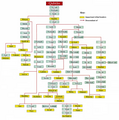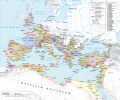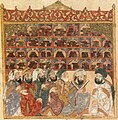عربلر
ظاهر
(عرب-دن يوْللاندیریلمیش)
| عَرَب ('arab) | |
|---|---|
| اهالی ساییسی | |
| ت 450 million (2011 est.)[۱] | |
| چوْخلی اهالی اولان بؤلگهلر | |
| عرب بیرلیگی 430,000,000[۲][۳] | |
| Significant Arab diaspora (including partial ancestry) | |
| برزیل | 12,000,000[۴][a] |
| فرانسه | 6,000,000[۶] |
| اندونزی | 5,000,000[۷] |
| تورکیه | 5,000,000[b][۸][۹][۱۰][۱۱] |
| آمریکا بیرلشمیش ایالتلری | 3,500,000[۱۲] |
| آرژانتین | 1,300,000–3,500,000[۱۳] |
| ايسرائيل (native) | 1,700,000[۱۴] |
| ونزوئلا | 1,600,000[۱۵] |
| کولومبیا | 1,500,000[۱۶] |
| ایران (native) | 1,500,000[۱۷] |
| چاد (native) | 1,493,410[۱۸] |
| Mexico | 1,100,000[۱۹] |
| Germany | 1,000,000+[۲۰][۲۱] |
| Chile | 700,000[۲۲] |
| Italy | 680,000[۲۳] |
| United Kingdom | 366,769[۲۴] |
| Canada | 380,620 (2011 Census)[۲۵] |
| Netherlands | 180,000[۲۶] |
| Australia | 350,000[۲۷] |
| Ecuador | 100,000–250,000[۲۸] |
| Honduras | 150,000–200,000[۲۹] |
| دیللری | |
| عرب دیلی | |
| دینلری | |
| Predominantly: ایسلام (سونیلر ·شیعه ·صوفیلیک ·اباضیه ·Alawite) | |
| مربوط اولان قومی قروپلار | |
| Other آفروآسیا دیللری, especially Semitic peoples such as Assyrians and یهودیلر[۳۰][۳۰][۳۱][۳۲][۳۳][۳۴]< | |
a Arab ethnicity should not be confused with non-Arab ethnicities that are also native to the Arab world. b Not all Arabs are Muslims and not all Muslims are Arabs. An Arab can follow any religion or irreligion. c Arab identity is defined independently of religious identity. | |

عرب آفریقا و آسیا قیطعهلرینده کومپاکت شکیلده یاشایان،دونیانین ان بؤیوک خالقلاریندان بیری. سعودی عربیستانیندا، سوریهده، اوردوندا، عراقدا، یمنده، عوماندا، میصیرده، سوداندان (اهالیسینین 1/2 – نی تشکیل ائدیرلر)، الجزایرده، لیبیده، تونیسده و س. اهالینین اکثریتینی تشکیل ائدیرلر . دونیادا سایلاری تخمیناً 311.648 میلیون نفردیر.[۳۶] حاضیردا دونیادا 21 موستقیل عرب دؤولتی وار .[۳۷]
عربلرین سویو
[دَییشدیر]ابراهیم پئیغمبر نسلیندن دیلر.


گؤرونتولر
[دَییشدیر]قایناقلار
[دَییشدیر]- نوتلار
- ^ Margaret Kleffner Nydell Understanding Arabs: A Guide For Modern Times, Intercultural Press, 2005, آیاسبیان 1931930252, page xxiii, 14
- ^ total population 450 million, CIA Factbook estimates an Arab population of 450 million, see article text.
- ^ World Arabic Language Day | United Nations Educational, Scientific and Cultural Organization. یوْخلانیلیب18 December 2017.
- ^ Arabs Love Brazil. They Are 7% of the Country.. Brazzil. آرشیولنیب اصلی نۆسخهدن on 2010-09-14. یوْخلانیلیب18 June 2017.
- ^ Características étnico-raciais da população: classificações e identidades (PDF). IBGE. 2013. p. 127. ISBN 9788524042447. 20 June 2017-ده یوخلانیب.
- ^ By (29 January 2008). French-Arabs battle stereotypes – Entertainment News, French Cinema, Media. Variety. یوْخلانیلیب22 August 2010.
- ^ Hadramaut dan Para Kapiten Arab (20 August 2009).
- ^ Kaya, Ibrahim (2009). The Iraqi Refugee Crisis and Turkey: a Legal Outlook. یوْخلانیلیب11 May 2017.
- ^ The Impact of Syrian Refugees on Turkey. یوْخلانیلیب18 December 2017.
- ^ Turkey's demographic challenge. یوْخلانیلیب18 December 2017.
- ^ UNHCR Syria Regional Refugee Response/ Turkey. UNHCR (31 December 2015). آرشیولنیب اصلی نۆسخهدن on 2018-03-05. یوْخلانیلیب11 May 2017.
- ^ The Arab American Institute. Aaiusa.org. آرشیولنیب اصلی نۆسخهدن on 1 June 2006. یوْخلانیلیب17 September 2011.
- ^ Inmigración sirio-libanesa en Argentina (20 June 2010). آرشیولنیب اصلی نۆسخهدن on 2010-06-20. یوْخلانیلیب2018-07-23.
- ^ 65th Independence Day - More than 8 Million Residents in the State of Israel (PDF). یوْخلانیلیب18 December 2017.
- ^ Abdel el-Zabayar: From Parliament to the Frontlines (15 September 2013).
- ^ Las mil y una historias (Spanish). semana.com (2004).There is an estimated population of 1,500,000 Arabs in Colombia.
- ^ Iran. آرشیولنیب اصلی نۆسخهدن on 3 February 2012. یوْخلانیلیب3 August 2013.
- ^ Chad. آرشیولنیب اصلی نۆسخهدن on 24 April 2013. یوْخلانیلیب3 August 2013.
- ^ Ben Cahoon. World Statesmen.org. World Statesmen.org. یوْخلانیلیب17 September 2011.
- ^ Mediendienst Integration. Syrische Flüchtlinge. یوْخلانیلیب8 June 2016.
- ^ Men of Arab descent not finding Germany as welcoming as they used to.
- ^ (ایسپانجا) En Chile viven unas 700.000 personas de origen árabe y de ellas 500.000 son descendientes de emigrantes palestinos que llegaron a comienzos del siglo pasado y que constituyen la comunidad de ese origen más grande fuera del mundo árabe.
- ^ Cittadini stranieri in Italia – 2016.
- ^ REPORT ON THE 2011 CENSUS – MAY 2013 – Arabs and Arab League Population in the UK. National Association of British Arabs. آرشیولنیب اصلی نۆسخهدن on 29 May 2014. یوْخلانیلیب25 April 2014.
- ^ Statistics Canada. 2011 National Household Survey: Data tables. یوْخلانیلیب11 February 2014.
- ^ "Dutch media perceived as much more biased than Arabic media – Media & Citizenship Report conducted by University of Utrecht" (PDF), Utrecht University, 10 September 2010, 2019-02-28-ده اوریجنال (PDF)-دن آرشیولشدیریلمیشدیر, 29 November 2010-ده یوخلانیب
{{citation}}:|archive-date=/|archive-url=وقت مؤهورونون اۇیغونسوزلوغو (کؤمک); Unknown parameter|dead-url=ignored (|url-status=suggested) (کؤمک) - ^ Monash University Research Repository. آرشیولنیب اصلی نۆسخهدن on 19 July 2011. یوْخلانیلیب24 March 2015.
- ^ Error on call to Şablon:cite web: Parameters url and title must be specified.
- ^ Larry Luxner (2001). The Arabs of Honduras. Saudi Aramco World. یوْخلانیلیب11 February 2016.
- ^ ۳۰٫۰ ۳۰٫۱ Shen, P; Lavi, T; Kivisild, T; Chou, V; Sengun, D; Gefel, D; Shpirer, I; Woolf, E; Hillel, J (2004). "Reconstruction of patrilineages and matrilineages of Samaritans and other Israeli populations from Y-chromosome and mitochondrial DNA sequence variation" (PDF). Human Mutation. 24 (3): 248–60. doi:10.1002/humu.20077. PMID 15300852. 2013-05-08-ده اوریجنال (PDF)-دن آرشیولشدیریلمیشدیر. 2018-07-23-ده یوخلانیب.
{{cite journal}}:|archive-date=/|archive-url=وقت مؤهورونون اۇیغونسوزلوغو (کؤمک) - ^ Wade, Nicholas (9 June 2010). "Studies Show Jews' Genetic Similarity". New York Times. https://www.nytimes.com/2010/06/10/science/10jews.html?_r=0.
- ^ Nebel, Almut; Filon, Dvora; Weiss, Deborah A.; Weale, Michael; Faerman, Marina; Oppenheim, Ariella; Thomas, Mark G. (2000). "High-resolution Y chromosome haplotypes of Israeli and Palestinian Arabs reveal geographic substructure and substantial overlap with haplotypes of Jews" (PDF). Human Genetics. 107 (6): 630–41. doi:10.1007/s004390000426. PMID 11153918.
- ^ Jews Are The Genetic Brothers Of Palestinians, Syrians, And Lebanese. Sciencedaily.com (9 May 2000).
- ^ Atzmon, G; Hao, L; Pe'Er, I; Velez, C; Pearlman, A; Palamara, PF; Morrow, B; Friedman, E; Oddoux, C (2010). "Abraham's Children in the Genome Era: Major Jewish Diaspora Populations Comprise Distinct Genetic Clusters with Shared Middle Eastern Ancestry". American Journal of Human Genetics. 86 (6): 850–59. doi:10.1016/j.ajhg.2010.04.015. PMC 3032072. PMID 20560205.
- ^ Serge D. Elie, "Hadiboh: From Peripheral Village to Emerging City" Archived 2008-05-09 at the Wayback Machine., Chroniques Yéménites: "In the middle, were the Arabs who originated from different parts of the mainland (e.g., prominent Mahrî tribes10, and individuals from Hadramawt, and Aden)". Footnote 10: "Their neighbors in the West scarcely regarded them as Arabs, though they themselves consider they are of the pure stock of Himyar."
- ^ Joshua Project – Unreached Peoples of the World : Arab World
- ^ Arabic German Consulting. آرشیولنیب اصلی نۆسخهدن on 2015-09-20. یوْخلانیلیب2015-09-21.






















